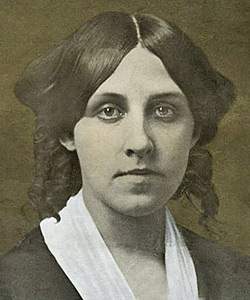Louisa May Alcott (American National Biography)
Scholarship
Throughout her career, Alcott struggled to reconcile her Transcendentalist conviction that individuals must think independently and be true to themselves ("every soul has its own life to live and cannot hastily ignore its duties to itself without bitter suffering and loss" [Diana and Persis]) with the morality of submission, self-control, and self-sacrifice in which her parents trained her, a morality that was enjoined particularly on women. She sometimes evaded the conflict by preaching the supreme value of womanly, especially maternal, love, in accordance with the contemporary cult of true womanhood. She tried to resolve it by claiming that independence was compatible with traditional womanliness, that a woman can happily divide her energies among ballot box, "needle, pen, palette and broom" (An Old-Fashioned Girl), and even by insisting that self-denial deepens and authenticates (women's) artistic achievement. However, her assertions are less persuasive than her characters who rebel against conventionally defined female goodness--angular young Jo March, who cannot be a "little woman" and is infinitely more engaging as a tomboy, and Jean Muir, who assumes the feminine role prescribed by society only to defeat that society. Jo is a self-portrait, and Jean suggests the revealing wish fulfillment of a dutiful daughter who bitterly resents her role and consequently nurses "bad" feelings under her "good" exterior (Saxton, in Stern [1984], 257). Alcott, however, did not let her resentment surface in behavior: she constantly sacrificed her personal comfort and the artistic quality of her works to the demands of her family.
Katharine M. Rogers, "Alcott, Louisa May," American National Biography Online, February 2000, http://www.anb.org/articles/16/16-00022.html.





